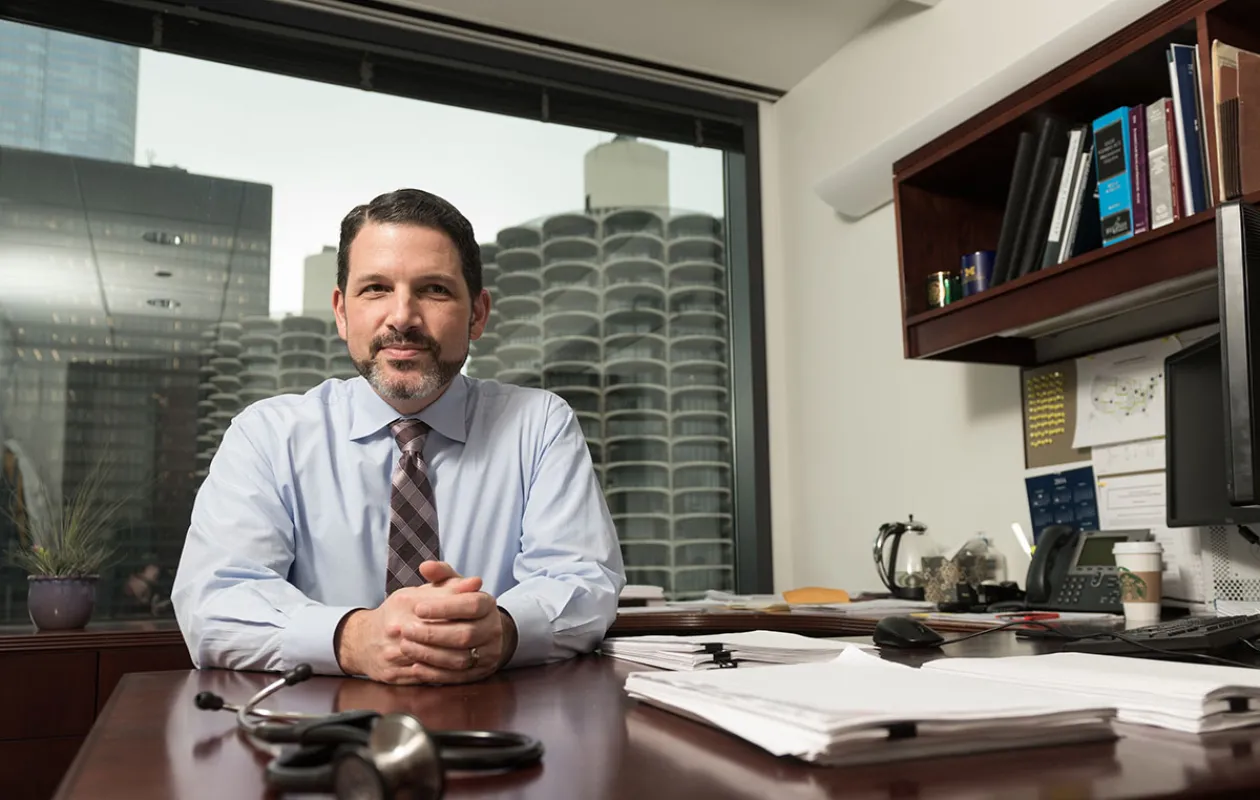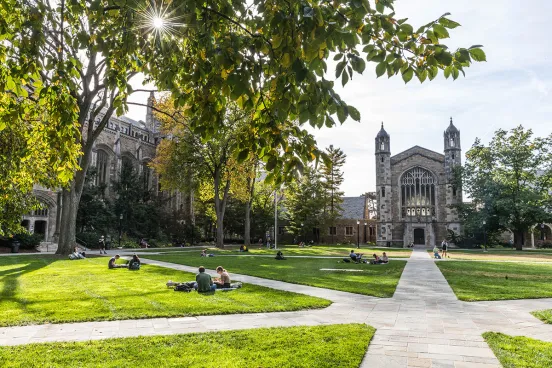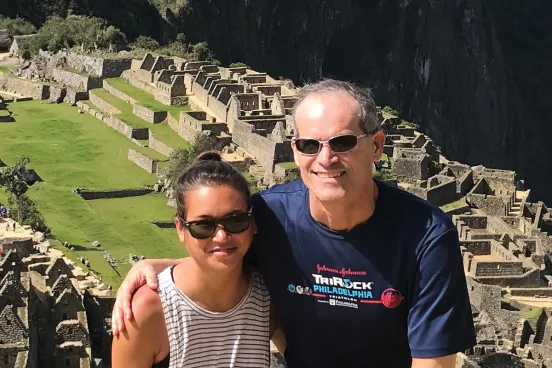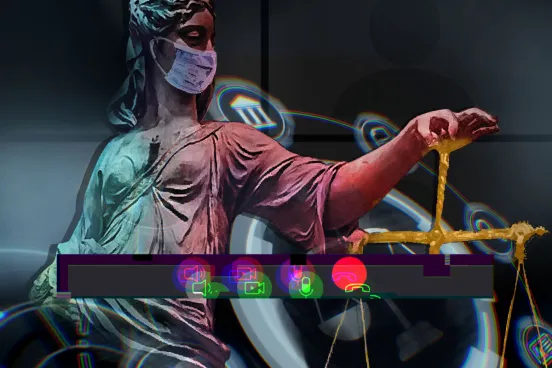After more than a decade as an ER physician, Mike Casner, ’14, decided it was time for a new challenge. He set his sights on law school, and never looked back.
If there’s one thing Casner, can’t stand, it’s inefficiency. From the careful notes he keeps about the annual vegetable garden in his Chicago backyard, to the simplicity of his office setup as an associate at Foley & Lardner LLP, Casner seems wired for organization and economy.
Indeed, after noticing that his attention would sometimes wander from his work to the magnificent view outside his 30th-floor office window, he moved his computer to face the interior of the room in order to limit the chance for distraction.
That self-discipline and focus served Casner well academically—first as a medical student and, more recently, as a law student. A 1997 honors graduate of Loyola University Medical School, Casner, 43, finished his emergency medicine residency at the University of Chicago hospitals in 2000. He then spent more than a decade as an emergency room physician in Chicago and San Francisco.
“The ER is where you see anything, from gunshots to the flu. One patient is having a heart attack, and the next is having a baby,” says Casner.
He enjoyed the challenge of never knowing what was going to come through the door—until he didn’t. Though Casner himself is reserved when asked about why he left, his domestic partner of more than 11 years, John Stryker, says the problem was that emergency rooms have become all-purpose clinics, where highly trained doctors find themselves giving vaccinations, renewing prescriptions, and taking care of basic medical needs that could be met better in a different setting.
“It’s a broken system, and it’s frustrating to work in,” says Stryker, a nurse practitioner. “A very inefficient system.”
And so, in 2011, Casner walked away from his job as an ER physician and came to Ann Arbor to try his hand at law school. He had taken some law-related classes in medical school and was intrigued. He relished a return to the intellectual rigor he’d found in medical school, and he wanted to find a new way to do meaningful work.
He was admitted to several top-tier law schools, ultimately choosing Michigan Law for the solid academics and the draw of Ann Arbor. It also was close to Chicago, where Stryker remained during Casner’s studies, taking care of their house and pets, as well as working at his own job. Casner spent holidays and summers back in Chicago and graduated in May 2014.
Casner describes returning to school after so many years away as “exciting, exhilarating, terrifying, and amusing.” He loved the energy of being back in the classroom among people who wanted to learn as much as he did, being taught by some of the top legal minds in the country. But he worried at first about getting his academic mojo back. It had been a long time since he’d sat in a classroom. Ultimately, he found he was able to enjoy the whole experience because he was able to put it in perspective.
“I was the oldest person in my class. I worked hard and wanted to do well, but I didn’t let it get to me. If I had a deadline, I took care of it. I didn’t freak out because nobody was dying. Nobody was bleeding. Nobody was giving birth,” he says.
Casner always intended to return to Chicago to practice law. Though originally from the East Coast—he’s lived in New Jersey, Boston, and Washington, D.C.—Casner says Chicago is home. He’s been there since he started medical school in the late 1990s, and, except for a three-year stint in San Francisco, he’s been there ever since.
“Chicago has it all: world-class museums, sports, theater, the lake and beaches, restaurants. And it has a lot of health care-related legal practices, which is what I want to do,” says Casner.
Though Foley & Lardner doesn’t allow new associates to specialize for their first few years, Casner says he’d like to represent hospitals and medical practices in regulatory and white-collar crime suits.
“Some of these medical entities get accused of Medicare or Medicaid fraud, when really it’s just that the system is so complicated that people make mistakes, without necessarily intending to do anything wrong,” says Casner.
He’s already been able to put his medical training to use. Colleagues working on a case involving transcripts of radio transmissions between paramedics/EMTs and their medical supervisors asked him to review and summarize the transcripts, pulling out key information from the medical jargon and acronyms.
“I know the lingo medics use and I can cut right to the heart of what’s important without getting bogged down by trying to decipher what is essentially a foreign language to non-medical people. It was fun to jump in and boil things down to their essence for what’s important to the case,” says Casner.
Casner admits that going back to being a newbie in law after years as a boss in medicine has presented some challenges. But he recognizes that he needs to learn the law just as he learned medicine, and that answering to more experienced colleagues is the only way he’s going to gain the knowledge.
His tendency toward efficiency and willingness to speak up have served him well. For instance, he tells of a busy day as a document review deadline approached. Faced with an ever-growing number of tasks from the supervising attorney, Casner asked if, rather than handle each new issue as it arose, it would be acceptable for him to wait and address everything together at the end of the day. The supervising attorney was fine with that, he said, as long as he met the final deadline, which he did. Casner says he preferred the efficiency of working on the project as a whole after business hours rather than taking a piecemeal approach throughout the day, and he isn’t sure that other new associates would have felt comfortable asking to do things their own way.
Having made a major career change himself, Casner enthusiastically suggests that others follow his path. “If you can swing it, I highly recommend getting out of college, picking a job, and working your tail off for a decade or two. Then leave it all behind and go do something else,” he says. “I also think life as an associate is a lot easier for an older person with work experience than it is for someone fresh out of school.
“It’s truly a remarkable experience being around students again; I know now why teachers do what they do. And it’s amazing going into a profession and bringing something new and original to the table.”








